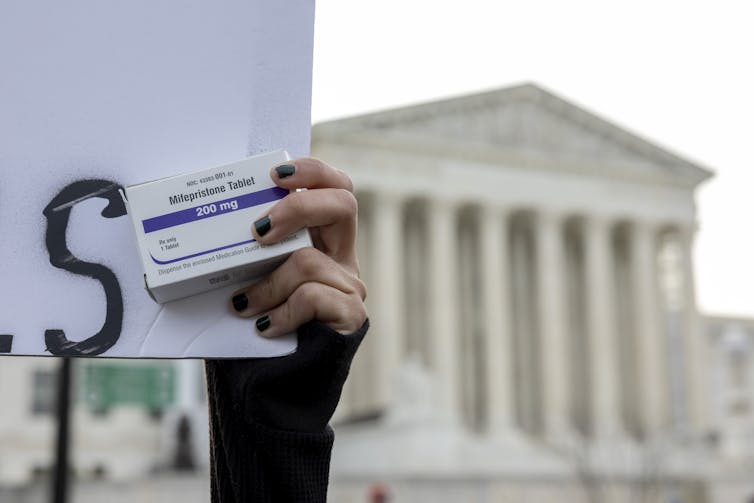Medicine doesn’t just have ‘conscientious objectors’ − there are ‘conscientious providers,’ too
Medical workers navigate their own moral and religious beliefs, professional standards, the law and the realities of clinical work – which can be especially complicated in abortion care.

When we think about harm, we typically think of physical or psychological suffering. But ethicists point out that we can also suffer “moral injury” when forced to do something at odds with our deeply held values.
Moral injury is often associated with military veterans. It can also occur in health care, however, when providers are coerced to offer care that violates their conscience. In fact, moral injury plays an important role in a case now before the Supreme Court, in which doctors opposed to abortion argue that the availability of mifepristone, a drug used to induce abortion, could force them to participate in the procedure.
As a sociologist who works in bioethics, I am interested in the ways conscience influences caregiver decisions about whether to take part in certain services. There are legal protections for “conscientious objection,” but the role of conscience in health care is much richer and more complicated than these laws allow. In medicine there are both conscientious objectors and conscientious providers.
Standing to sue?
In March 2024, the Supreme Court heard oral arguments challenging the Food and Drug Administration’s decisions that expanded access to mifepristone.
First approved by the FDA in 2000, the drug has been widely used with few side effects. In 2016, the agency lowered the recommended dose, extended the weeks of pregnancy when it could be used, and allowed nurse practitioners and physician assistants to prescribe it. Further changes in 2021 made it possible to dispense the medicine by mail.
In 2022, the Supreme Court overruled Roe v. Wade, deciding that the Constitution did not protect the right to abortion. Soon after, a number of medical associations opposed to abortion rights challenged the FDA’s 2016 and 2021 decisions.
The case eventually made its way to the Supreme Court, where the first step was to decide whether the plaintiffs had the right to sue, which could be granted only if they had been harmed by the FDA decisions.

The plaintiffs claimed the FDA’s new guidelines put them at risk of “conscience injury.” They argued that mifepristone might result in complications that would send a woman to an emergency room where, as the only nurse or doctor on duty, they might be forced to take part in terminating a pregnancy.
Conscientious objectors – and providers
Much of the oral argument focused on the fact that mifepristone rarely causes complications and that, in any case, federal “conscience clause” laws allow medical personnel to decline to participate in care they find morally troubling.
The first U.S. law allowing medical personnel to refuse to provide care that offends their beliefs was passed in 1973, shortly after the Supreme Court affirmed the right to abortion. Known as the Church Amendments, the law prohibits institutions that receive federal funds from requiring employees to participate in sterilizations or abortions, if doing so would go against their religious or moral convictions.
Since then, a number of additional conscience protections have been written into law. In addition to abortion, medical caregivers may refuse to provide other services on religious or moral grounds, including, for example, euthanasia, prescribing and providing birth control pills and performing gender-affirming surgeries.
Conscience clauses are exclusively used to justify the refusal to provide care: “conscientious objection.” But ethicists point out that it is also important to recognize “conscientious provision”: when conscience leads caregivers to provide care.
Tough decisions
In 2018, my colleagues and I conducted interviews to better understand the role of conscience in “morally contested care.” Our team asked 50 nurses, anesthesiologists, obstetricians and obstetricians in training – all working in a state where the right to abortion is protected – to explain how they made decisions about whether to participate in abortion care.
What we heard challenges assumptions about how conscience informs care.
Almost immediately we learned that conscience affects how someone defines “participation.” When we asked our interviewees if they “participated” in abortion care, most responded, “What do you mean by participate?” Some with moral qualms about abortion refused to take part in any of the many tasks involved in terminating a pregnancy: from preparation for surgery to administering anesthesia to care after the procedure. Others defined participation as being in the room when the termination occurred, so, in spite of their qualms, they were willing to assist in pre- and post-operative tasks.
Listening to caregivers’ stories revealed how the values they bring to their work can evolve.
Several described how experiences inside and outside the clinic altered their approach to abortion. Some providers who were generally opposed to abortion mentioned that their preconceptions about why women choose to terminate a pregnancy had changed after working with patients. Others talked about how events in their lives changed their views. One nurse explained that her own miscarriages led her to see women undergoing abortions as people who, like her, suffered loss and deserved humane care.

On the other hand, some strong supporters of abortion rights were challenged by the reality of the procedure, causing them to rethink their moral boundaries. For example, we heard from an obstetric resident who described being emotionally challenged and morally conflicted by the fact that ultrasound images are used to guide both terminations and healthy pregnancies. At one moment, the team was using an ultrasound of a continuing pregnancy to find out the sex of the baby, and at another moment, they were looking at an ultrasound to assist in a termination.
Living their values
Doctors and nurses who work in maternity care struggle to balance their moral commitments: deeply held values that originate not only in religion but also in professional responsibilities and obligations to colleagues. One anesthesiologist told us that while he would otherwise decline to provide abortion care, he chose to provide it because he recognized that his refusal would mean waking a colleague in the middle of the night to substitute for him.
Similar moral beliefs do not always result in similar decisions. Christian values led some caregivers to avoid all elements of abortion, while these same values encouraged others to care for women terminating their pregnancies. As one nurse put it: “My Christian beliefs and values and morals informed my decision. … Here’s this person who’s hurting who needs help. Would my God that I believe in and worship want me to turn my back on her and just stand there and judge her instead of help her?”
The moral work of maternity caregivers involves constant negotiation between their personal and professional values, their commitments to others and the reality of their clinical work. Our conversations helped us to see that moral injury can occur not only when medical personnel are pressured to provide care that is at odds with their deeply held religious and moral values, but also when they are prevented from providing care that aligns with those values.
At present, conscience clauses protect only those who refuse to provide care, but as limitations on reproductive freedom increase, caregivers may seek that same protection for providing care.
Raymond G. De Vries received funding from the National Institutes of Health, the Greenwall Foundation, the Office of Research at the University of Michigan, and the Institute for Research on Women and Gender (University of Michigan).
Read These Next
Is hard water bad for you? 2 water quality engineers explain the potential benefits and pitfalls tha
Hard water might dry out your hair and skin − but having hard water isn’t necessarily a bad thing.
Alcohol use disorder can be treated with an array of medications – but few people have heard of them
Alcohol is responsible for more deaths than overdoses from opioids and all other substances combined,…
History says tariffs rarely work, but Biden’s 100% tariffs on Chinese EVs could defy the trend
The early timing of Biden’s move, changing supply chains and national security fears suggest the tariffs…




